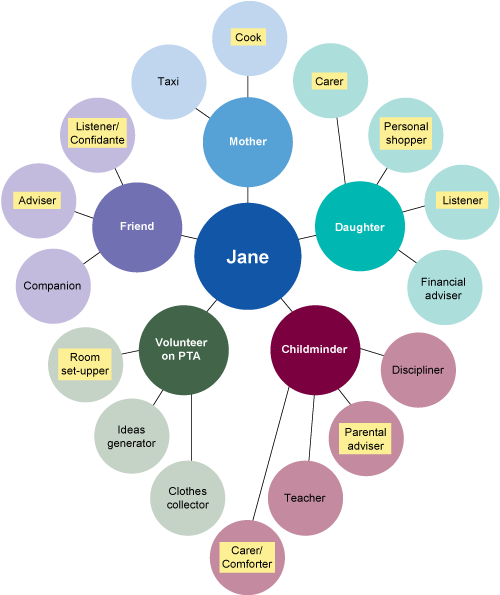1 The roles we play
The Oxford English Dictionary defines ‘role’ as:
The function performed by someone or something in a particular situation or process.
Everyone plays a number of different roles in their daily life, often having to juggle more than one different role at any time. Some of these roles may be linked to work or to a function in a family group. It’s a bit like wearing different hats to represent all the different responsibilities you have and parts of your personality that these may play to. You can be playing more than one role at any time and each role can itself be split into different smaller roles which you adopt to perform that bigger function.
Thinking like this can feel confusing and make you wonder who ‘you’ are. But the reality is that we are all complex beings with the capacity to ‘be’ different people at different times. To an observer this may be visible by the different clothes or uniform that you wear or a badge that describes your role at that time. Those that know you well may also be able to tell when you are speaking or acting in a certain way to match the situation you are in. The way you speak and behave around your friends on an evening out, for example, may look (and feel) very different from the ‘you’ when you are at work and in a meeting with your supervisor. Do you have a different voice for example when you answer the telephone?
While you may recognise that this is the case and be able to think immediately of different roles you play in your life, you may also have a strong sense of who the ‘real’ you is. It may be that some of the roles you play feel less comfortable than others and require you to act a part that does not feel true to the essential you. It can take more effort to perform these roles and could become exhausting if you have to do this for too long without a break. You may be aware that there are some roles you have to enact that really play to your strengths and when you are doing these things you feel like you are really in the moment and performing to your best.
Take some time to think about the different roles you play and start to identify some of your preferred roles in life and the roles that play to your strengths in Activity 1.
Activity 1 Mind-mapping your roles
In Week 1 you met Jane, a single mum currently working as a childminder. When you met her in Week 1 she was looking to expand her experience of working in teams and since that time has joined her School Parents Association. Look at the mind-map Jane made in considering some of the different roles that she ‘plays’ in her life. You may be able to think of other roles which she has not added and spot similarities with some of the roles you can identify in your life. You will see that Jane has highlighted in yellow the roles she is happiest playing.
Take some time now to consider some of the different roles you play in your life. In the toolkit you will find a mind-map tool and you should use this now to record your thoughts (Use this link [Tip: hold Ctrl and click a link to open it in a new tab. (Hide tip)] to open the toolkit in a new tab or window and come back here when you are done). Colour your preferred roles in one colour and those you dislike playing and recognise as being more taxing to perform another colour.
Discussion
Well done for completing this. You might be surprised at the number of different roles you ‘inhabit’ in your life. You can probably also see that this is something that is liable to change as you move through life. Whilst you don’t always have total control on the roles you play in your life, it is useful to get a sense of those that you enjoy most and those that you struggle with more.
Next you will look at the different functional roles people can take in a team.

